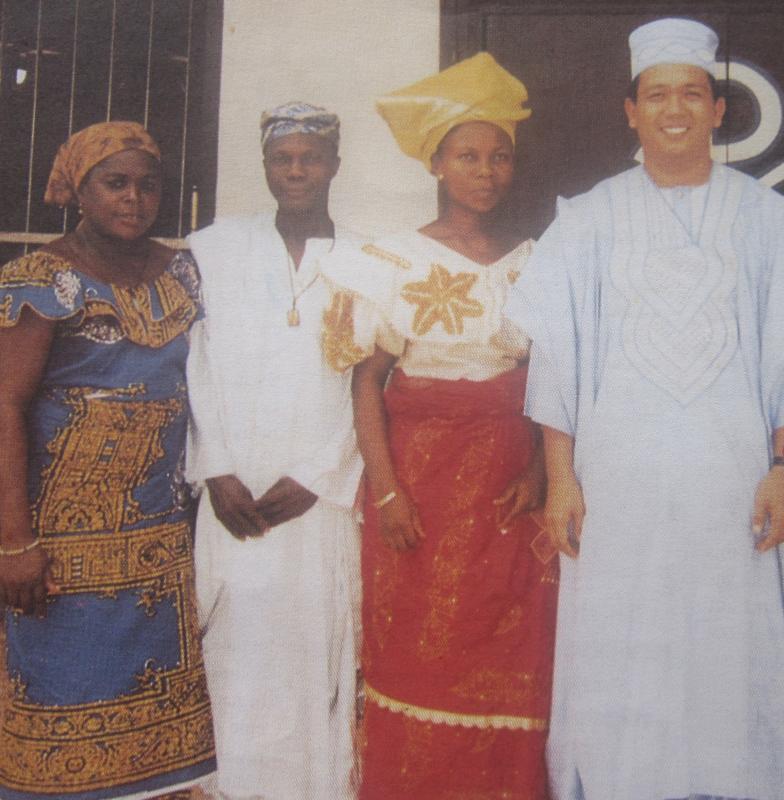The Giant Of Africa

By Fr. Enrico C. Eusebio Jr., sj
June 20, Biyernes nang gabi iyon, umuulan at walang kuryente, noong dumating ako dito sa Nigeria, sa Lagos, sa parokya kung saan ako nadestino, Christ the King Catholic Church. Mababaw ang tulog ko noong gabing iyon, puyat kinabukasan, pero napasabak na agad ako sa trabaho. Tinulungan ko ang sangol. Kinahapunan, 4:00 hanggang 6: 30 ng gabi, nagpakumpisal kami ng tuloy-tuloy at walang putol. Kinalingguhan, namuno ako sa kaunaunahan kong Misa dito sa Africa. Grabe at nakaka-overwhelm na karanasan iyon! Bagong karansan para sa akin ang makaharap ang 2 libong taong ibang-iba sa hitsura at kulay ko.
For a Filipino and Asian like me, coming to Africa and encountering black people is a totally novel experience.
White Man
It was to our great surprise and amusement that after hearing much greetings of “E kabo!” during our initial weeks and months in Nigeria, we soon realized that we were being called “oyibo!” (“White man!) By the common man and woman, and especially the children, on the streets. What can be more amusing for us Filipinos than to be called “White man!” right? We were hypothesizing that perhaps here in Nigeria, anyone who is not black is white. But then, even some of us Filipinos are darker that some Nigerians, So perhaps, it is more accurate to say that here in Nigeria, the land of Black Peoples anyone who is not African is an “oyibo”.
Identity Crisis
Kapag naglalakad ako sa kalye, madalas sinisigawan ako ng mga bata ng ‘Oyibo!’ Sa loob-loob ko lang, tawa ako nang tawa. White man na pala ako dito sa kulay kong ito, na ang tawag nila ay ‘yelow’. Madalas naman kung pinapahula ko sa kanila kung taga saan ako, lagi nilang sinasabi, ‘China!’ kung sinasabi ko, ‘Wrong’ try again,’ ang madalas nilang sinusunod na hula ay ‘Japan’ ‘Korea!’ at pati ‘India!’ minsan nga, may biglang ng ‘France!’ Aba, nagmumukhang French na pala ako dito sa Nigeria!
Inspiring Experiences
In the Tagaytay Mission Orientation Course for missionaries which we attended, veteran missionaries advised us never to compare our mission areas with the Philippines and our own culture. Just observe and look and realize that we are not their saviors, and that we are even not learning more from them. That God has been there before us, that the place we are stepping on is holy ground. That was a very helpful advice, but that mission attitude does not come as automatic reaction it one is new to the mission work; in a sense, it has to be learned, indeed even painfully learned. Sometimes, I just catch myself complaining: Bakit sila ganyan, bakit ganito, bakit ganoon, mabuti pa ang Pilipinas at ang mga Pilipino...Ooops! Teka nga muna, mali yata ang ganyang pag iisip. And these experiences, definitely key moments inspired by the Holy Spirit, help me back to the missionary spirit of hope and joy in serving these people, our brother and sister Africans, to whom I am sent.
Harvest Thanksgiving
I have already presided at a number of Harvest Thanksgiving Masses here in Nigeria, and each of them lasted for 4 hours! After the usual offertory collections, the harvest thanksgiving by various, individuals and groups begin. The emcee calls these groups to come dancing to the altar, bringing their thanksgiving offerings in cash or in kind, while the priest sprinkles them with holy water as they drop in their offerings. This goes on for about three hours. Kaya naman halos mamanhid ang braso ko sa kakabendisyon! The liturgy is so full of joyful songs, dances and in this one discovers the lively sense of thanksgiving and celebration of Africans. This harvest tradition of Nigerians is well-entrenched not just in local Catholicism and Christianity, but in Nigerian culture itself. During the pre-Christianity times, they were already practicing this tradition, and this was directed in thanksgiving to their gods. This was reoriented in Catholic doctrine and practice by the early missionaries, and since then, the harvest has become one of the focal points of the year in Nigeria liturgical life.
Opportunity to Serve
God has been so good to me. This opportunity for me to minister to Nigerians and Africans has been one of the greatest things the Almighty has done for me. And I thank Him giving me this beautiful opportunity to serve him and His African people as a missionary. Hindi madaling mabuhay nang malayo sa kinagisnan at sa Bagong kultura-tatamamaan ka ng culture shock, umaatake minsan and pagkabugnutin at init ang ulo, ang homesickness at kalungkutan-pero nagbibigay kapatagan, kaginhawaan, at kaligahayan ang Panginoon. He comforts, reassures, refocuses my vision when blurred.